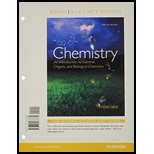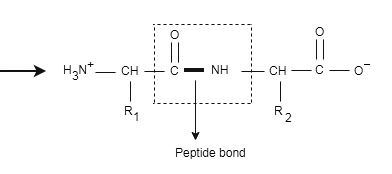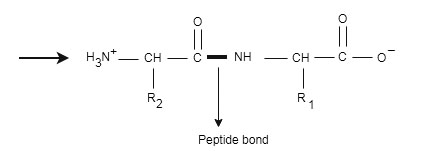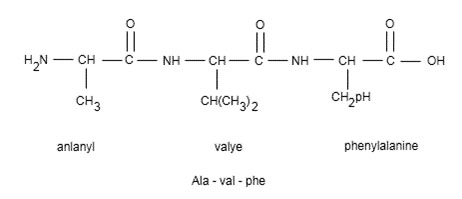
Interpretation:
The most important reaction of amino acid is formation of peptide bonds. In this reaction


Or


Concept Introduction:
Any number of amino acids can be bonded in a continuous chain in any order. The end of the peptide with the free amino group is called terminus and the end of the peptide with the free carboxyl group

It is called -terminus. Peptide structures are generally drawn with terminus at the left and terminus at the right. The nomenclature of peptide is also in the same sequence.
Ex:

Want to see the full answer?
Check out a sample textbook solution
Chapter 16 Solutions
Chemistry: An Introduction to General, Organic, and Biological Chemistry, Books a la Carte Edition & Modified MasteringChemistry with Pearson eText -- ValuePack Access Card Package
- Find a molecular formula. ( MW: 102 )arrow_forwardExperiment #8 Electrical conductivity & Electrolytes. Conductivity of solutions FLINN Scientific Scale RED LED Green LED LED Conductivity 0 OFF OFF 1 Dim OFF 2 medium OFF 3 Bright Dim Low or Nowe Low Medium High 4 Very Bright Medium nd very high AA Δ Δ Δ Δ Δ Δ Δ Δ Δ Δ Δ SE=Strong Electrolyte, FE = Fair Electrolyte CWE = Weak Electrolyte, NE= Noni Electrolyte, #Solutions 1 0.1 M NaCl 2/1x 102 M NaCl, 3/1X103 M Nall Can Prediction M Observed Conductivity Very bright red Bright red Dim red you help me understand how I'm supposed to find the predictions of the following solutions? I know this is an Ionic compound and that the more ions in a solution means it is able to carry a charge, right? AAAA Darrow_forward(SE EX 2) Prblsm 4-7: Can you please explain problems 4-7 and color code if needed for me. (step by step) detail explanationsarrow_forward
- (SE EX 2) Problems 8-11, can you please explain them to me in detail and color-code anything if necessary?arrow_forward(ME EX2) Problems 15-16 Could you please explain problems 15 through 16 to me in detail, step by step? Thank you so much! If necessary, please color-code them for me.arrow_forward1.)show any electrophilic aromatic substitution, identify the electriphile, nucleophile and transition statearrow_forward
- (SE EX 2) Problems 15-16, can you please explain them to me in detail and color-code anything if necessary?arrow_forward(ME EX2) Can you please explain problems to me in detail, step by step? Thank you so much! If needed color code them for me.arrow_forward(SE EX 2) Problems 1-3, can you please explain them to me in detail and color code anything if needed.arrow_forward
- (SE EX 2) Problems can you please explain them to me in detail and color-code anything if necessary?arrow_forward(SE EX 2) Problems can you please explain them to me in detail and color-code anything if necessary?arrow_forward(ME EX2) Prblms 5-7 Can you please explain problems 5-7 to me in detail, step by step? Thank you so much! If needed color code them for me.arrow_forward
 ChemistryChemistryISBN:9781305957404Author:Steven S. Zumdahl, Susan A. Zumdahl, Donald J. DeCostePublisher:Cengage Learning
ChemistryChemistryISBN:9781305957404Author:Steven S. Zumdahl, Susan A. Zumdahl, Donald J. DeCostePublisher:Cengage Learning ChemistryChemistryISBN:9781259911156Author:Raymond Chang Dr., Jason Overby ProfessorPublisher:McGraw-Hill Education
ChemistryChemistryISBN:9781259911156Author:Raymond Chang Dr., Jason Overby ProfessorPublisher:McGraw-Hill Education Principles of Instrumental AnalysisChemistryISBN:9781305577213Author:Douglas A. Skoog, F. James Holler, Stanley R. CrouchPublisher:Cengage Learning
Principles of Instrumental AnalysisChemistryISBN:9781305577213Author:Douglas A. Skoog, F. James Holler, Stanley R. CrouchPublisher:Cengage Learning Organic ChemistryChemistryISBN:9780078021558Author:Janice Gorzynski Smith Dr.Publisher:McGraw-Hill Education
Organic ChemistryChemistryISBN:9780078021558Author:Janice Gorzynski Smith Dr.Publisher:McGraw-Hill Education Chemistry: Principles and ReactionsChemistryISBN:9781305079373Author:William L. Masterton, Cecile N. HurleyPublisher:Cengage Learning
Chemistry: Principles and ReactionsChemistryISBN:9781305079373Author:William L. Masterton, Cecile N. HurleyPublisher:Cengage Learning Elementary Principles of Chemical Processes, Bind...ChemistryISBN:9781118431221Author:Richard M. Felder, Ronald W. Rousseau, Lisa G. BullardPublisher:WILEY
Elementary Principles of Chemical Processes, Bind...ChemistryISBN:9781118431221Author:Richard M. Felder, Ronald W. Rousseau, Lisa G. BullardPublisher:WILEY





